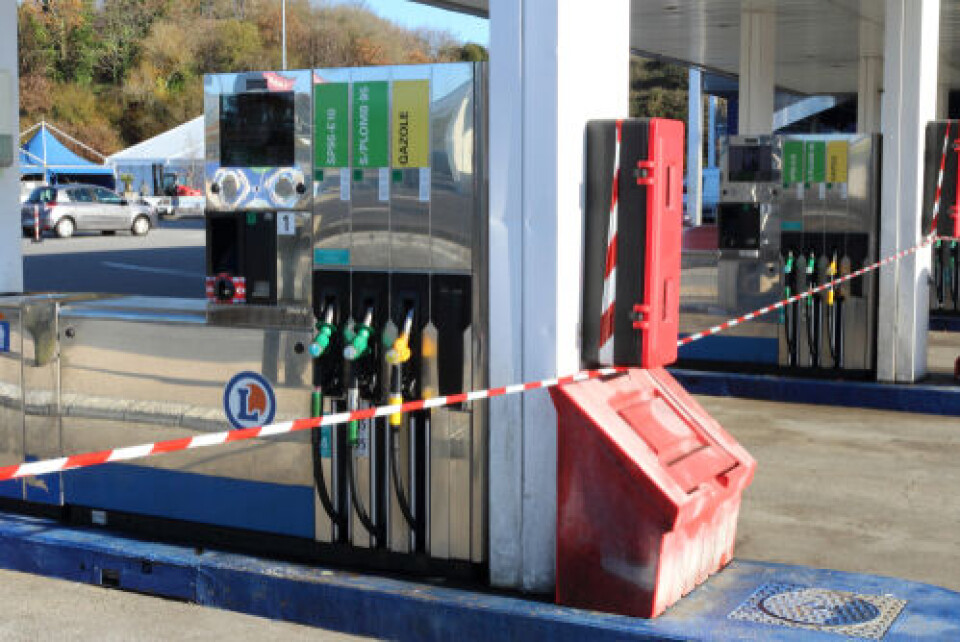-
La Voie Bleue: European Cycle Route of the Year is in France
700km bike path linking Luxembourg and Lyon has been crowned winner of the 2026 title
-
MAP: See how your location in France affects online food shop prices
New analysis shows how your shop compares on average
-
Further sightings of processionary caterpillars in France prompt action from local authorities
Caterpillars have arrived early after mild winter
Petrol workers requisitioned in France as shortages begin to bite
The action comes as 40% of petrol stations are closed in the southern French department surrounding Marseille

Petrol station workers in the south of France have been requisitioned by the government as fuel shortages worsen, amid ongoing stoppages and strikes against pension reform.
The energy ministry announced on Tuesday (March 21) that three-in-seven workers had been requisitioned to come to work at the petrol depot in Fos-sur-Mer "faced with the worsening supply tensions in Bouches-du-Rhône”.
In a statement, the department prefecture said: “We are working on requisitions of service stations for important services and priority professions.”
Requisition protests
Protests against the requisitions have begun in La Ciotat, Arles, and Fuveau, near Aix-en-Provence. Departmental motorways have been blockaded.
The CRS (Compagnies républicaines de sécurité) aimed to force the Fos site to reopen, prompting 400 protesters to gather, with three law enforcement officers reporting “serious injuries” in clashes outside.
🔴 LES OUVRIERS FONT RECULER LES CRS AU DÉPÔT PÉTROLIER DE FOS
— Révolution Permanente (@RevPermanente) March 21, 2023
Au dépôt de Fos-sur-Mer, les ouvriers se sont rassemblés contre les réquisitions ordonnées par le gouvernement. Face à la répression il faut faire front, partout ! #greve21mars #GreveGenerale
📽️ @ColeStangler pic.twitter.com/Da9aqLrxiR
An ‘opération escargot (snail operation, in which vehicles drive very slowly on roads)’ protest also arrived at the Fos site this morning, via the A7 motorway.
In a statement to the prefecture, Bouches-du-Rhône CGT boss Olivier Mateu said: “Nothing will weaken the determination of the workers. If you touch one of our comrades in a refinery, we’ll set fire to the department.” He clarified that he did not mean literally ‘setting fire’, but responding with anger and protests.
Fuel shortages region-wide
It comes as around half of the petrol stations in Marseille and surrounding areas are reporting shortages, while an estimated 40% of stations in Bouches-du-Rhône are closed.
Var and Alpes-Maritimes are also suffering from a lack of fuel. A prefectural decree now states that it is illegal to transport petroleum products and jerrycans in Vaucluse, Var, and Bouches-du-Rhône. This is intended to stop drivers from filling up their tanks, and then taking more petrol away “just in case”.
Energy Minister Agnès Pannier-Runacher, said: “So far, stations remain generally well-supplied at the national level, but tensions are crystallising in PACA (Provence-Alpes-Côte-Azur).”
Nationwide, the number of stations reporting a lack of fuel has risen to 8%.
At the time of writing (March 21), some 967 stations nationwide have partial shortages, while 739 are completely out of fuel, figures from the collaborative website Penurie.mon-essence.fr show.
Yesterday, Emmanuel Lépine, general secretary of union CGT Fédération nationale des industries chimiques, said that drivers should fill their tanks while they can, in anticipation of shortages due to ongoing industrial action against the government’s controversial pension reforms.
He said: “I have never seen such determination from petrol workers.”
Read more: Refinery blockades: Tips on how to find petrol and diesel in France
Read more: Unions say French ‘fuel shortages will intensify’. Are they right?
What else is happening with the pension strikes in France?
- Government survives two no-confidence votes: Opposition parties failed to get enough votes for their no-confidence motions to force a change in government or policy. Prime Minister Elisabeth Borne has remained in her post, and the reforms are now set to go to France’s Constitutional Council for approval.
- Pension protests continuing: Protests are continuing across France, with a rising number of violent clashes reported, including with police. MPs from the left-wing Nupes coalition have called on protesters and police to “stop the massacre” and said some images of the protests looked like “images from the worst of authoritarian regimes”.
- Ports closed: Among the transport sector workers to strike today are workers and dockers at ports, with the CGT union declaring a ‘ports morts (dead ports)’ day.
- Crisis meetings ongoing: President Emmanuel Macron is today meeting with many key government figures in a bid to continue discussions and find a solution to the crisis. He met with Ms Borne this morning and had lunch with Assemblée president Yaël Braun-Pivet and Senate president Gérard Larcher. This evening he will meet ministers. Ms Borne is also holding meetings with opposition groups.
- President to speak: Mr Macron is set to give his first interview since his government survived two no-confidence votes in the French parliament. It will be broadcast on Wednesday (March 22) at 13:00.
- Opposition suggesting referendum idea: Opposition groups to the pension reforms have suggested that one way to break the stalemate would be to hold a national referendum on the issue. However, Mr Macron has announced that he is against this idea.
Related articles
French petrol stations see shortages as pension protests continue
French PM survives two no-confidence votes over pension reforms
























